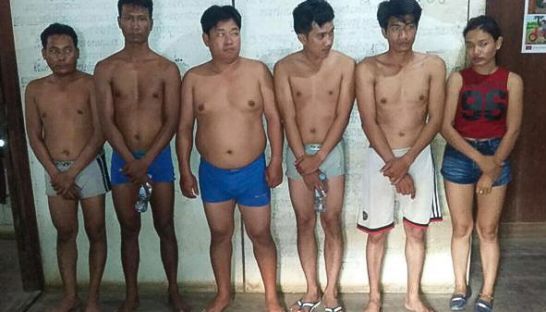Happy Khmer New Year!

Photo supplied by the police shows nearly naked defendants who were arrested on fraud charges. It was published last month in the Phnom Penh Post.
Consider me to be a grammar Nazi. Perhaps even worse, I tend to be a journalism tyrant as well, someone who finds himself, perhaps irrationally, irritated by lapses from commonly high journalistic standards.
I read Cambodia’s three English-language dailies online every morning or in print just about every afternoon that I am in Phnom Penh. Rarely do I get through any of the publications without finding a lapse in standards that are, to my mind, unforgivable.
I decided one day in December to skim the three journals for their lapses over a few days. Herewith what I discovered:
In a piece about the cancellation of tolls on a road, the Phnom Penh Post wrote:
. . . one employee who was busy removing his belongings from a toll booth yesterday said that he was worried for the future.
“We are concerned about finding a job, because now we are unemployed, so we would ask the government to help us find a new job,” the worker said.
There was no response apparently sought from the government, which was otherwise quoted on aspects of the change.
Widespread dependence on anonymous sources is what arguably is a breach of ethics as well. Charges are leveled, names are named and no one in authority is willing to be identified far too often.
Whether to attribute the anonymity to fearful bureaucrats or cunning intrusion into the rule of law is debatable.
Another questionable practice is to reveal the names of victims of sexual assault as well as photos of the maimed and bloodied bodies of accident or crime victims and the demonstrably grieving survivors of those individuals. Local newspapers targeting Cambodians seemingly strive to outdo each other in the gruesomeness of the photos that they publish. (One particularly disturbing one can be found toward the end of this post.) Similar images can be seen on local television.

Admittedly, I could be accused of hypocrisy for publishing the image above, but I hope its inclusion demonstrates my point about inappropriate photos and is small enough to avoid offending readers. Warning: Some readers may be disturbed by the image toward the bottom.
Regarding sexually abused women, the following story began this way:
A male garment worker was yesterday sentenced to five years in jail for raping a 19-year-old seamstress at a factory in Phnom Penh, despite the woman withdrawing her complaint in a letter to the court.
Phnom Penh Municipal Court presiding judge San Sophath convicted Chan Thy, 28, of raping his colleague Sim Dina on September 11 at the Chi An Garment Factory in Sen Sok district where they both work.
(Complaints of acknowledged crimes frequently are withdrawn after the perpetrator pays off the victim with sums of money that are laughably disproportionate in contrast to the offense. Suspects taken into custody even in brutal cases frequently are released after payoffs as well or, sometimes, after simply receiving “education.” Moreover, charges and sentences for grave crimes are reduced regularly because the defendant pleads intoxication.)
Then there were last year’s revelations about an appalling amount of plagiarism at the Khmer Times, which I noted in a post early this year.
Universities here do offer journalism education, but few are the graduates who achieve an acceptable level of skill. Some do manage to master English and learn to do well on the job, of course, but the hurdles they encounter are steep.

This photo of a decapitated woman was published in a Khmer-language daily with far more clarity than I am allowing in this space.
To be fair, the amount of what I consider to be ethical lapses is relatively low. And no one can deny that they occur all over the world, even in major newspapers that have accumulated a slew of prizes for their good work.
Another aspect worth mentioning is the apparent hordes of Cambodians who only pretend to be reporters for legitimate publications or, most often, news media that they invent. In return for staying silent about an alleged criminal activity that they observe or might report from sources, some collect bribes with near certain impunity. For them, purported journalism is just a criminal activity that masquerades as something it is not.
I do not mean to tar all reporters and editors here with the same brush. There are many who who achieve high standards.
Nor should any of the foregoing be mistaken to reflect on a number of freelancers who are old hands in Southeast Asia and Cambodia. Most reliably report and analyze events here with a level of quality and competence that I envy.
We owe them a debt of gratitude.
As for the others, they deserve our scorn.
Update: The Phnom Penh Post published a long piece on half-naked perpetrators on 8 April.
E-mail: malcolmncarter@gmail.com
